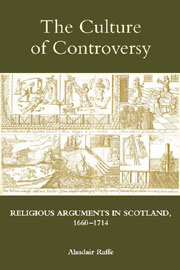Book contents
- Frontmatter
- Contents
- List of Maps and Illustrations
- Acknowledgements
- Abbreviations and Conventions
- Map 1 Scottish counties
- Map 2 Presbyteries, 1660–1714
- Introduction
- Part I Controversial Discourse
- Part II Controversial Action
- Conclusion: Concepts and Consequences
- Glossary
- Bibliography
- Index
- STUDIES IN MODERN BRITISH RELIGIOUS HISTORY
Conclusion: Concepts and Consequences
Published online by Cambridge University Press: 05 February 2013
- Frontmatter
- Contents
- List of Maps and Illustrations
- Acknowledgements
- Abbreviations and Conventions
- Map 1 Scottish counties
- Map 2 Presbyteries, 1660–1714
- Introduction
- Part I Controversial Discourse
- Part II Controversial Action
- Conclusion: Concepts and Consequences
- Glossary
- Bibliography
- Index
- STUDIES IN MODERN BRITISH RELIGIOUS HISTORY
Summary
The ‘culture of controversy’ is intended as a framework for thinking about collective disagreement in early modern societies. The concept draws attention to the circulation of information, the expression and communication of arguments, and the practices of participation. In this book, my emphasis has been on religious debates, but the arguments between presbyterians and episcopalians reflect more general features of controversial culture. There are five especially important points. First, there was widespread involvement in religious arguments, at all social levels. But not all participants were treated equally. Popular participation in controversy shaped the substance of debates, but did little to undermine the hierarchies of society. Of course, few of those involved in Scotland's religious arguments sought to bring about a more equal social order. Second, people across the country engaged in religious disputes. Their actions and arguments were communicated in various ways – and sometimes with difficulty – to political centres, in Scotland and England. Third, participation in controversy took place through verbal discourse and non-verbal actions. Most of our evidence comes from polemical texts, but there is scope for much more work on the physical expressions of opinion. Fourth, the circulation of arguments in print became more extensive as the period went on; print publication in Scotland expanded to unprecedented levels after 1679. Nevertheless, print was one element of a controversial culture in which manuscript circulation, preaching and face-to-face communication remained vital.
- Type
- Chapter
- Information
- The Culture of ControversyReligious Arguments in Scotland, 1660-1714, pp. 234 - 237Publisher: Boydell & BrewerPrint publication year: 2012



